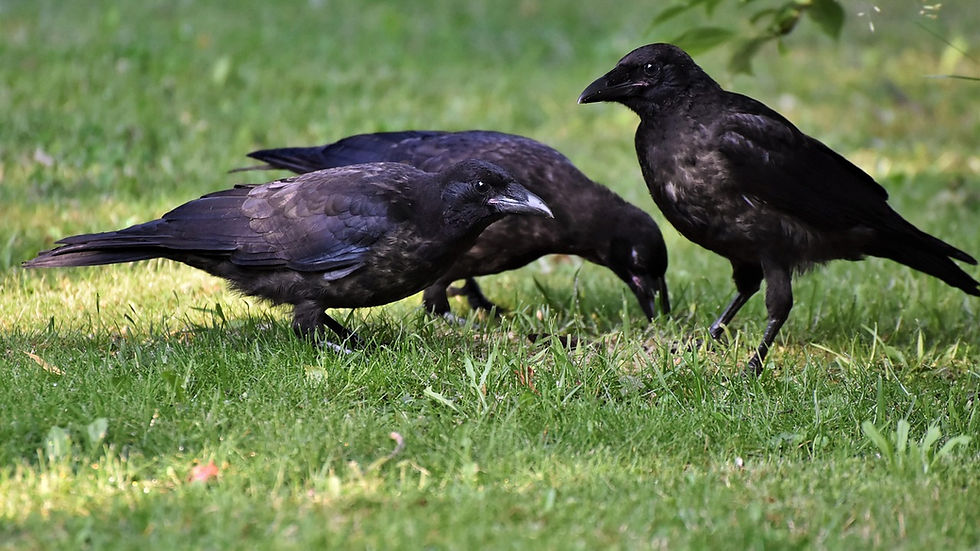Crow Lifespan Explained: What It Means for Long-Term Bird Pressure
- Aviaway Bird Blog
- Sep 24, 2025
- 3 min read
Updated: Oct 20, 2025
Crows are some of the most adaptable and intelligent birds in North America. This adaptability is one reason they often become a persistent problem for property owners. Understanding how long crows live isn't just a fun fact for bird enthusiasts; it directly explains why infestations can linger. It also highlights the importance of long-term bird control strategies.
How Long Do Crows Live?
In the wild, most crows live 7–8 years on average, but they can survive much longer under favorable conditions. Some crows have been documented living for 15–20 years. In captivity, where threats are minimal, lifespans can stretch beyond 30 years.
This longevity makes crows very different from short-lived nuisance birds like sparrows or starlings. A single crow family can remain in the same location for years, with multiple generations building loyalty to a roosting or feeding site.

Why Crow Lifespan Matters for Bird Pressure
The fact that crows live for a decade or longer has a direct impact on pest pressure:
Generational Roosting: Young crows often return to the same nesting area where they were raised. If your site becomes a “crow hub,” you’re looking at long-term occupation.
High Intelligence: Crows remember safe roosting sites and food sources. Once they decide your rooftop, solar panels, or parking lot are reliable, they’ll keep coming back.
Group Dynamics: Crows live in large family groups called murders. Because they stay together for years, one established group can multiply the impact of droppings, noise, and property damage over time.
Long-Term Risks from Persistent Crows
A long crow lifespan means that problems compound:
Building Damage: Droppings are highly acidic and can corrode metal, stone, and HVAC equipment when left untreated.
Safety Concerns: Flocks create slip hazards around entryways and sidewalks.
Health Risks: Crows carry parasites and pathogens that can affect humans, pets, and other wildlife.
This persistence is why short-term fixes rarely work. Loud noises or occasional cleanups might scare birds away briefly, but crows quickly learn and adapt.
Effective Crow Control Strategies
Because crows live so long, effective control comes down to installing durable, long-term solutions rather than temporary deterrents:
Bird Netting: Creates a physical barrier to keep crows from accessing rooftops, courtyards, and loading docks. Learn more about bird netting solutions here.
Grid Wire Systems: Prevent large birds like crows and gulls from landing in open areas by creating a “no-fly zone.”
Falconry Services: Natural predation is one of the few things that intimidates crows, making falconry a highly effective solution for large sites. Learn more about using falconry for bird control here.
Site Hygiene: Reducing food waste and standing water removes attractants that keep crows coming back.
By combining these methods, property managers can prevent a single crow family from turning into a long-term infestation.
The Importance of Proactive Measures
Understanding the behavior and lifespan of crows is crucial for effective management. Crows are not just a nuisance; they can cause significant damage over time. Their intelligence and adaptability mean that they can quickly learn to exploit any weaknesses in your defenses.
Monitoring and Assessment
Regular monitoring of your property is essential. Identify areas where crows are most active. This can include rooftops, parking lots, and near food sources. By assessing these areas, you can better understand the scale of the problem and develop a targeted approach to control.
Community Involvement
Engaging with the community can also play a vital role. Encourage neighbors to adopt similar bird control measures. A united front can make your area less attractive to crows and other pest birds.
Education and Awareness
Educating staff and property users about the issues related to crows can also help. Inform them about the importance of keeping food waste contained and maintaining cleanliness around the property. This can significantly reduce the chances of attracting crows.
Key Takeaway
The crow's lifespan, along with their higher-than-average intelligence, is why infestations are so difficult to resolve. With birds living up to two decades, a crow problem today can still be a crow problem ten years from now without proactive solutions. For a complete overview of crow species, including behavior, nesting, and control methods, visit our Crow Overview Page.
If you’re dealing with persistent crows on your property, don’t wait for the problem to compound. Contact AviAway today for expert crow control strategies that protect your property for the long haul.






























Comments